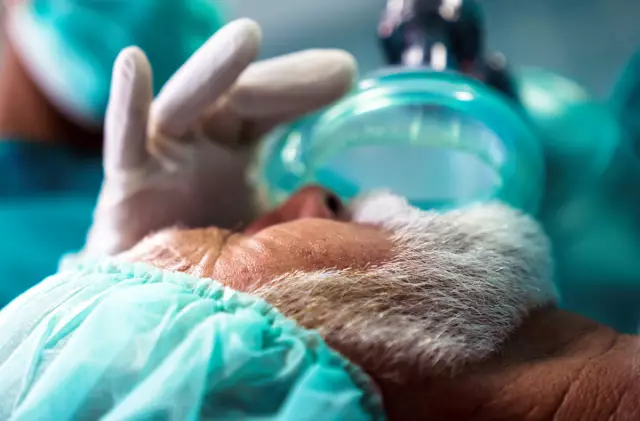- Author Rachel Wainwright wainwright@abchealthonline.com.
- Public 2023-12-15 07:39.
- Last modified 2025-11-02 20:14.
7 common misconceptions about anesthesia
The history of the use of anesthesia during operations goes back over 160 years. Every year, hundreds of thousands of surgeries are performed around the world, during which substances are injected into patients that put them to sleep and relieve pain. Many myths and misconceptions are still associated with the use of anesthesia. Let's comment on the most popular ones.

Source: depositphotos.com
Anesthesia gives many complications
In the early stages of the development of anesthesiology, side effects during the use of general anesthesia occurred in 70% of cases. Today, complications of this kind are observed in 1-2% of patients undergoing surgery using anesthesia. As a rule, these are allergic reactions to the injected substances. If the operation is carried out with the participation of an experienced anesthesiologist-resuscitator, severe consequences can usually be avoided. The most serious complication of anesthesia is anaphylactic shock, but it occurs in only one patient in ten thousand.
After anesthesia, some patients experience discomfort, which is manifested by vomiting, nausea, dizziness, pain when swallowing, temporary memory loss, or confusion. All these symptoms disappear within a few hours after waking up.
Contrary to popular belief, general anesthesia does not adversely affect mental performance.
The use of anesthesia is not always justified
In domestic medicine, the situation is rather the opposite. Until now, many medical procedures in our country are carried out without anesthesia, which is extremely difficult for patients and extremely inconvenient for doctors. This state of affairs is especially typical for dentistry: for many decades, almost all types of dental treatment (including very painful ones) were carried out "live". Today, Russian doctors are trying to use more gentle methods. Changes for the better are taking place, but so far rather slowly.
You may not wake up after anesthesia
The overwhelming majority of deaths of patients during operations have nothing to do with the action of the medications used for anesthesia. Most often, the causes of death are an unforeseen situation that developed in the process of intervention, and the notorious human factor. During the operation, the patient's life in the full sense of the word is in the hands of the anesthesiologist-resuscitator. Unfortunately, the shortage of such specialists in domestic hospitals is about 50%. Until this problem is resolved, there is a risk that the overworked anesthesiologist will not be distracted from the next patient in time or make some mistake.
Before the invention of anesthesia, patients rarely survived during and after surgery
This is largely true. In an era when surgical interventions were carried out without anesthesia, no more than 30% of patients survived during operations. The likelihood that the patient would not survive the painful shock was very high, and the chances of survival directly depended on the skill and speed of the doctor's work.
Under anesthesia, a person has erotic visions
A side effect of this kind is indeed sometimes encountered when using sombrevin for anesthesia, a drug that until recently was used in short-term surgical interventions. Now sombrevin is prohibited due to the high risk of allergic reactions and a large number of contraindications.
The effect of anesthesia can be interrupted during surgery
An experienced anesthesiologist selects the drugs necessary for anesthesia in advance and calculates their dosage based on the patient's weight and the characteristics of his condition. During the operation, medicines are supplied into the patient's bloodstream using automatic dispensers, and the equipment that monitors vital parameters controls the amount of incoming solutions and corrects the process in case of any deviation from the norm. Therefore, the statement that it is possible to wake up before the end of the operation due to "lack of anesthesia" is not true.

Source: depositphotos.com
Anesthesia does not work on a drunk person
This is not true, but there is still a real basis for such delusions. The fact is that long-term use of alcohol leads to an acceleration of the process of removing certain drugs from the body. These include those substances that are used as anesthesia. This means that a person who is intoxicated will fall asleep under their influence, but to deepen anesthesia, he may need higher doses of medication.
No one is safe from ailments that require surgery to get rid of. You should not be afraid of using anesthesia during the operation. However, in order to avoid complications, the patient must warn the anesthesiologist about his allergy to any drugs and tell about all the chronic diseases that he suffers from.
YouTube video related to the article:

Maria Kulkes Medical journalist About the author
Education: First Moscow State Medical University named after I. M. Sechenov, specialty "General Medicine".
Found a mistake in the text? Select it and press Ctrl + Enter.






